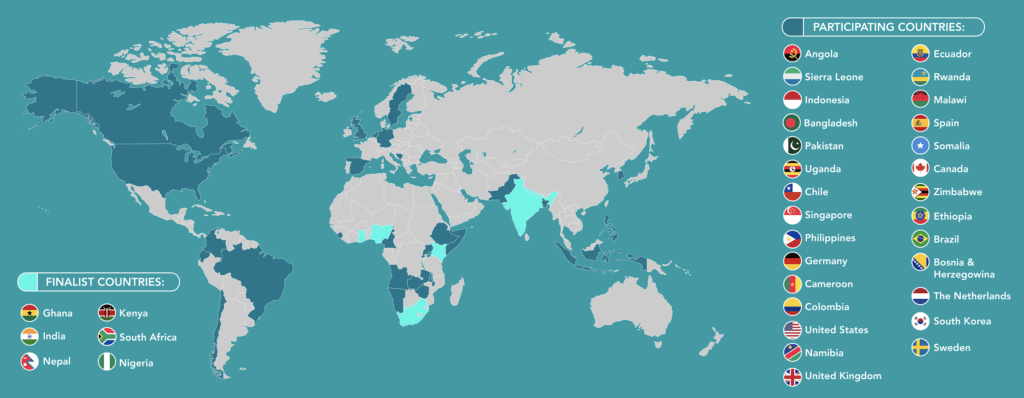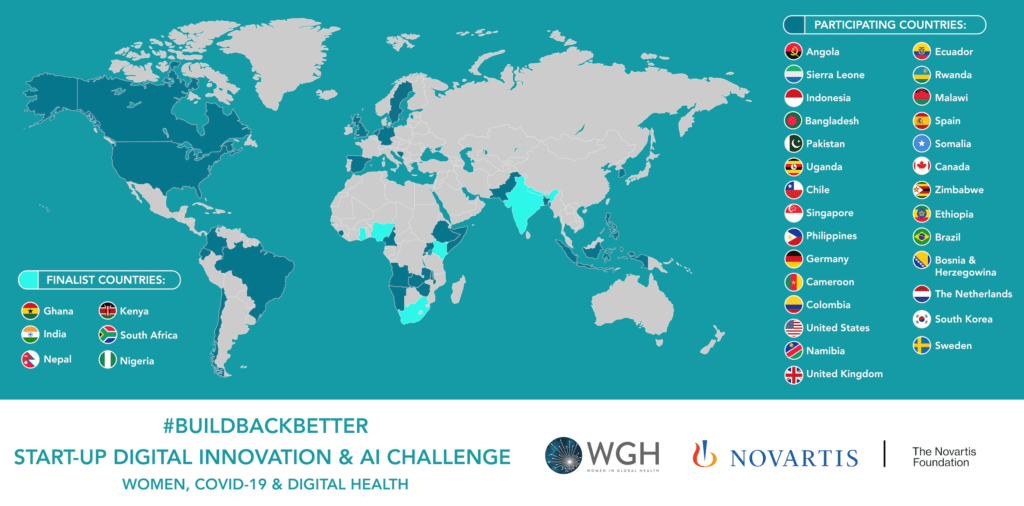
Introduction
Healthtech and artificial intelligence (AI) innovation are needed, more than ever, in the face of the COVID-19 pandemic. Healthcare systems are being pushed to their limits, and homegrown and innovative ways of delivering healthcare through technology are being developed rapidly. However, turning a blind eye to gender inequities in healthtech and innovation hinders progress. Women in Global Health’s 5 Asks for Global Health Security discusses a gender-sensitive approach to health security, data collection/analysis, and response management. We recognise that gender biases in society are compounded in our AI algorithms, data governance, and policy. If we want to take action, we need more women leading in science, technology, engineering, and mathematics.
Women have to fight gender stereotypes to prove themselves as innovators. Women’s voices continue to be excluded from the highest decision-making platforms when it comes to digital health and AI. Bold initiatives that confront power and privilege are urgently needed to allow women to contribute equally in the fight against global health challenges like COVID-19.
“We need to foster inclusiveness among the creators of the artificial intelligence solutions used in low- and middle-income communities because diversity among developers makes it so much more likely that the solutions themselves will be inclusive. Being an innovator is one of the hardest things to do, with most successes happening only after many failures. That is why it’s so important to find ways to support innovators from underrepresented groups – like women – to not give up on their ideas.” – Dr. Ann Aerts, Head of the Novartis Foundation.
About the Challenge
Pushing against the assumption that innovation often emerges from high-income countries and flows to LMICs, the #BuildBackBetter Start-Up Digital Innovation and AI Challenge provided a platform for women-led start-ups who are based/partnering with LMICs to showcase their innovative healthtech and AI solutions that will further gender parity during COVID-19 and beyond.
Supported by the Novartis Foundation, the Challenge celebrated women as creators of digital health and AI solutions and leaders of healthtech companies and initiatives. The Challenge received 127 entries from 39 countries across the world. These entries were evaluated by an independent panel of 11 judges, who selected the six finalists.

The Finalists
The six finalists of the Challenge represent healthtech and AI innovation at its finest, spanning multiple continents and contexts. The innovations take different angles to address challenges unique to women who are disproportionately affected by the COVID-19 pandemic.
Developers in Vogue (Ghana) provides student healthcare workers with digital and tech skills, to empower young women innovators. Several of the final solutions address the critical issue of ensuring that maternal health is not compromised during the pandemic and that the gains made in the last decades in maternal health are not lost. Swastha Naari (Nepal) is developing a mobile-based application to allow health workers to track pregnant women in their area. Wheels for Life (Kenya) ) and Birthing Bridge (South Africa) are innovative triaging systems to empower pregnant women in their care and prevent delays and barriers to accessing it. Clafiya (Nigeria) is a digital platform that enables women in Nigeria to access primary healthcare services, recognizing the barriers that women may face to addressing their own care needs. Lastly, effective and equitable vaccine rollout will be essential to controlling the COVID-19 pandemic. However, entrenched gender inequities in many countries mean girls often miss out. Suvita’s (India) intervention is an effective SMS reminder system for parents to vaccinate their children.
Varsha Venugopal presenting for Suvita:
Immunization is a gendered issue in India, and unlike in most other countries, in India, the under-5 death rate for girls is higher than for boys. We use a proven, cost-effective digital method to “nudge” mothers to access maternal healthcare and to get their children immunized: customized, localized, and targeted SMS reminders. Our meta-analysis estimates an average effect size of 8% points increase in overall vaccination rates. @varsha_v1234
Rhoda Oduro presenting for Developers in Vogue:
Our innovation seeks to provide a tech and digitally-focused curriculum in the study materials of student health trainees so they can develop digital solutions from school, and implement and incorporate them in the systems when they come out.
We are training and upgrading the digital skills of active female healthcare professionals through workshops and seminars. @devinvogue
Srijana Raut presenting for Swastha Naari:
Swastha Naari is developing a simple mobile-based application targeting both pregnant women and health workers. This ANC tracker, designed for health workers, helps identify pregnant women in their catchment area for antenatal checkups and helps health workers, especially auxiliary nurses and midwives, to ease their workload. Our application consists of features like diet plan, fitness/yoga, and consultation with a doctor directly through video meetings, that support pregnant women in receiving technically sound healthcare. @swasthanaari
Dr. Jemimah Kariuki presenting for Wheels for Life:
We are a team that is dedicated to providing prompt triage consultation and transfer of pregnant mothers from home to hospitals to prevent delay in accessing maternal health care and reduce maternal morbidity.
Zerleena Khan presenting for Birthing Bridge:
Birthing Bridge is a solution to bridge the gap in maternal care during Covid-19 and beyond by offering a platform for expecting mothers to self-care and triage through a three-pronged approach of information dissemination, text and call platform, and triage network. @Birthing_Bridge
Itoro Inoyo and Jennie Nwokoye presenting for Clafiya:
Clafiya is a digital platform that connects patients in semi-urban and rural parts of Nigeria to Community Health Workers (CHWs) to provide home-based primary care services. With our short USSD code, women in Nigeria with limited access to primary care services can register, pay, and request for the nearest registered CHW to administer home-based services. Additionally, Clafiya leverages AI to apply predictive analytics to geotagged USSD messages for disease surveillance of emerging disease outbreaks in rural and remote regions. This enables government agencies and policy-makers to make data-driven decisions on resource allocation in impacted regions. @Clafiya1
Conclusion
Innovation can emerge from any context. Addressing the unequal power dynamics and privilege that undermine global health could help address the biases faced by innovations that are emerging from LMICs. Healthtech and AI need women in the driving seat if it is to deliver gender-responsive solutions that could support healthcare systems to achieve greater gender parity in the context of COVID-19 and for the future of pandemic preparedness.
Acknowledgements
I would like to pay my special regards to Katie Rice, Women in Global Health and Professor Yap Boum II, Regional Representative for Africa at Epicentre, as well as Dr. Ann Aerts, for their contributions to this blog.
The #BuildBackBetter Start-Up Digital Innovation and AI Challenge is part of the Women in Global Health COVID 50/50 Campaign.
The Author(s) declare(s) that there is no conflict of interest.